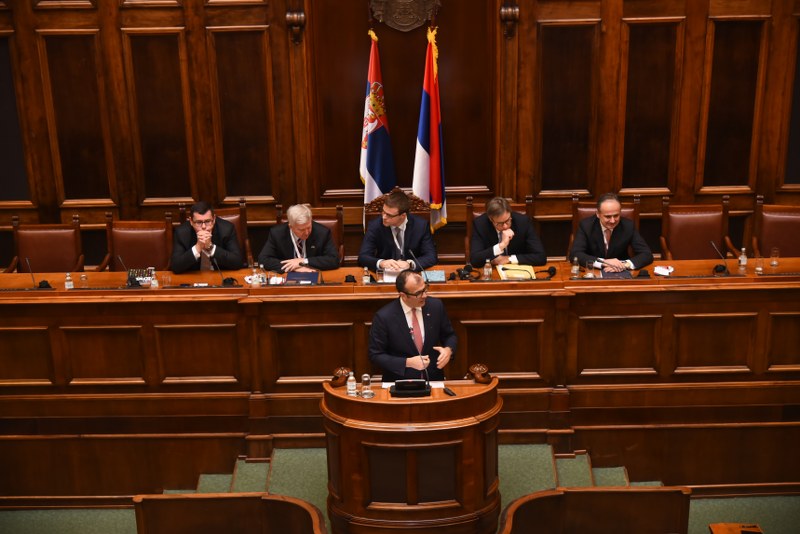Four ambassadors to Serbia – the US ambassador H.E. Kyle Scott, the German Ambassador H.E. Axel Dittmann, the Croatian Ambassador H.E. Gordan Bakota, and the Hungarian Ambassador H.E. Attila Pinter – partook in the panel discussion titled ‘The Brave New World’. Aleksandar Simurdić from the European Movement in Serbia was the panel’s moderator while the heavy political burden from 2017 and projections for 2018 were the panel’s topics.

H. E. Kyle Scott, the US Ambassador: The biggest challenge is on the economic front. The economic growth has to encompass the entire globe. The EU has had a robust growth of 2.5% but we, as a country which had such growth for several years, are not satisfied with that. Prosperity has to be evenly spread all over the population so we need a 3.5% growth. Secondly, there is a global disorder, which is something diplomats have to take care of. There are pockets of despair, poverty, radical elements, and terrorist organizations, and this is the failure on the part of governments. The international norms are frequently breached and violated. The weapons of mass destruction are in the hands of irresponsible people. Global health should be improved but not to the detriment of our economic growth. We are concerned about the crumbling cohesion of the EU, but we are optimistic since consolidation usually follows after such steps. We are deeply worried about the Russian politics towards this region, Georgia, Moldova and Ukraine – Russia is currently breaking several postulates of the Helsinki Act.
H.E Axel Dittmann, German Ambassador: I believe that we are better equipped to deal with the latest challenges like climate changes, migrations, and economy. None of the individual countries can address these issues individually. We think that the joining the EU does not mean a loss of sovereignty, but its growth. I appreciate Serbia’s commitment to the fight against climate change. Terrorism is a huge threat. We, in the EU, have taken a number of steps towards fighting terrorism, and we are working together with the countries like Serbia. The Agreement with Turkey regulating the issue of refugees is functioning, and we have also concluded agreements with several African countries like Nigeria, Mali, and Senegal, to prevent illegal immigration. The economic growth in the eurozone is not limited only to the north and this is great. The number of new jobs is growing and so are investments. We see an enormous amount of progress. We will work on Brexit although we have to say that we are disappointed. Regardless of Brexit, we still have to work on building a new, long-lasting relationship with the UK.
H.E. Gordan Bakota, Croatian Ambassador: Both migrations and formation of the European defence pillar, PESCO are significant because if Europe wants to ward off terrorism and deal with migration, it has to have a clear defence capacity. The migrant crisis from two years ago, and the one from today are not the same. There is awareness now that 8% of the world population lives in the EU, and that the EU generates 22% of the global GDP and provides 50% of the development assistance in the world. We need to act preventively in order to help African countries with a potential migrant crisis. We have to work everywhere, including Syria and Iraq, on boosting security and economic development in order to prevent a new wave of migration. Also, there should not be government vacuum anywhere. There is also Libya which plays an important role in the migrant crisis. The EU needs to improve its defence mechanisms, and thus become a stronger factor in the world in preventing situations from arising in the region and wider. This is a special soft power that official Brussels has to use. It is also exceptionally important to implement the Minsk Agreement regarding the situation in Ukraine. Furthermore, Mr Juncker’s state of the union speech provides a great encouragement. Considering all of the aforementioned and the positive economic trends, we can say that we have enough reason to be optimistic. We also need to avoid populism as a solution to problems.
H.E Attila Pinter, Hungarian Ambassador: I suppose that this region is more stable and safer than ever. However, the countries in the region still have a lot of open political issues. The other challenge for the region could be hundreds or even thousands of ISIS fighters returning to their homelands. The third challenge is the EU accession of the regional countries which the member states should support. Four countries from the region are going to preside over the EU in the immediate future – Bulgaria, Romania, Austria and Croatia – and I expect spectacular results to be accomplished. Serbia opened 12 out of 35 chapters in the accession process and this is a good result. The final problem could be illegal migration. Together, we have managed to close the so-called Balkan Route. Approximately 30% of the population of Sub-Saharan Africa plans to leave their homes in the near future in order to get to Europe. There will be a lot of migration pressure from that part of the world, and we have to prepare for it. We also need to face economic problems – unemployment is very high in spite of high GDP growth. The lack of infrastructure is a big problem and we have to improve it, along with increasing our interdependence.